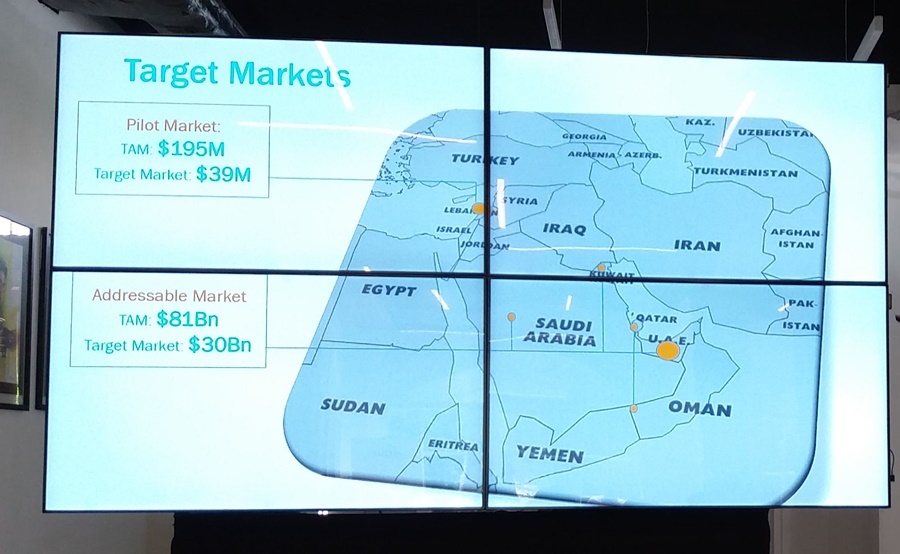Seedstars Beirut: Everyone wants to scale

“Lebanon is a great place to test ideas and launch startups. This relatively small market is better than others when it comes to the low costs of launching a startup, acquiring seed funding, and communicating with corporates.”
With these words, Samy El Khoury, founder of Vision in Motion, described the Lebanese ecosystem that helped him reach Silicon Valley and get seed funding.
His company Vision in Motion, that offers a customer analysis program which helps stores increase their sales, won the first place at Seedstars Beirut event held on Friday (September 22), at the coworking space Antwork.

Vision in Motion will represent Lebanon at the Seedstars Summit in Switzerland next year, where the winning startup will gets $1 million equally distributed between cash prizes and equity funding.
The other startups that participated in the competition in Lebanon will receive $500 in services from Google, Amazon and other Seedstars partner, in addition to a $ 3,000 coupon from Aramex.
New space in Beirut
At the same event, Kamran Samadli, MENA associate at Seedstars, told wamda that “Seedstars is working on launching a new Seedspace in Beirut, a space for entrepreneurs to live, work and cooperate in one place.”
While he did not specify a launching date for this space, he explained that one of its features would be allowing Beirut entrepreneurs to move to other Seedspace locations in Switzerland for example, live and work there, free of charge.
Lebanon as a testing arena
Most Lebanese entrepreneurs at Seedstars found that the Lebanese ecosystem is a great sandbox.
Angela Solomon, CEO of Jaleesa, a platform that connects parents with babysitters, which won the second place at Seedstars, said: “working on proving your concept in Lebanon allows easier access to seed funding than in other countries. It also allows you to reach out to mentors and get the support.”
Mohamad El Hoss, founder of CloudSale, a B2B marketplace, experienced this by hand.
El Hoss used to work in the UAE, before quitting his job and starting his own company. However, high costs in the UAE brought him back to Lebanon to launch his company. “We spent around $30,000 till now, mostly on development, but this would have been twice or three times as much in Dubai,” he said.
El Hoss realized that his company needs to develop its network with both customers and corporations, and doesn’t just require funding. “There are plenty of sources for funding. Next to my personal savings, we received $5,000 from Kafalat [for SME loans], and we can ask for an additional $10,000 after we show some positive workflow results,” he added.

However, others do not seem to the see the country as as an ideal sandbox for all startups.
Ziad Feghali, founder of Living Book, a platform that allows users to create interactive children’s books, which won third place at the event, stated that he wants to move to the US which he considers his primary market.
He explained that the “US is considered an important market for books, and that Americans are interested in reading and encourage their kids on doing so more than parents in our region. They are also tech-savvy and have an increased interest in ebooks”.
When asked why did he start his company in Lebanon, he said that in the business world, it doesn’t matter where you start, what matters is where you are headed.
The other side
The availability of funds does not mean that all is well in the country. Various infrastructure development, including communication, electricity, transportation, regulations in the digital field and others, must be addressed. The country also faces occasional political instability which affects different economic sectors.
Though communication in Lebanon has improved lately, the internet speed and call quality are still under scrutiny.
Hassan Bayloun, CTO at Jaleesa, said regulations affect their work as a digital platform, highlighting the importance of drafting laws that adapt to this growing field. As an example, he explained that e-signatures are not recognized in Lebanon, despite being internationally adopted. “This affects our work and forces us to meet with the client face to face to sign deals that can be done online in other countries,” he said.
Meghan Warner from Seedstars, who was on the judging panel, said that many Lebanese startups with interesting ideas want to scale out. “This is not a bad thing. It shows a positive image about the Lebanese ecosystem that should be open to international investors and mentors, and invite them to participate in local events to meet startups here,” she added.


